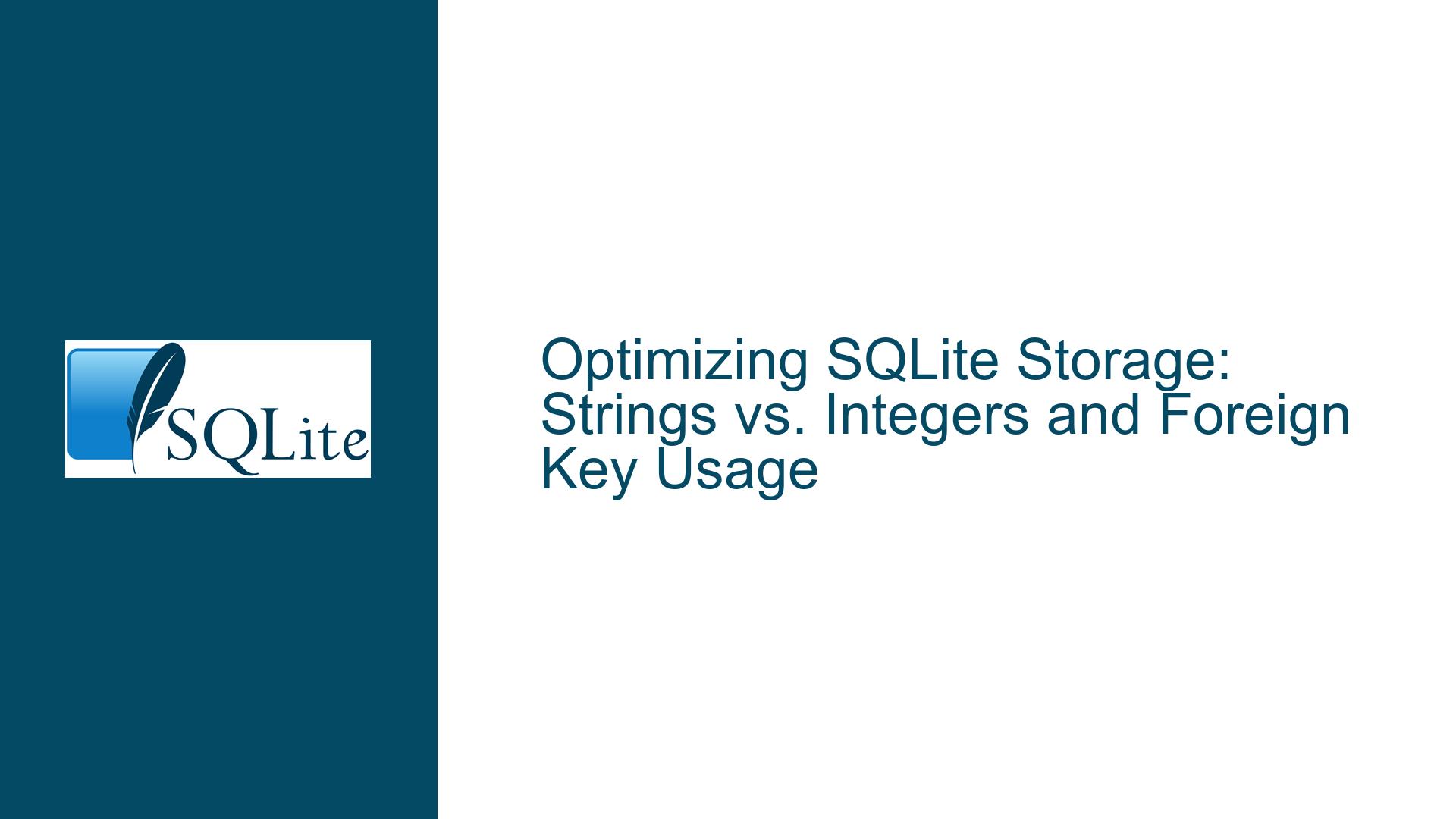Optimizing SQLite Storage: Strings vs. Integers and Foreign Key Usage
Disk Usage and Storage Efficiency: Strings vs. Integers in SQLite
When designing a database schema in SQLite, one of the critical considerations is storage efficiency. A common question arises: should you store strings directly in a table or use integer foreign keys to reference those strings in a separate table? This decision impacts not only disk usage but also query performance, data integrity, and maintainability.
Strings like "audio" and "video" occupy 6 bytes each (including the null terminator), while integers typically use 4 bytes. At first glance, it might seem that storing integers is more space-efficient. However, the reality is more nuanced. SQLite’s storage format for integers and strings, the overhead of foreign key relationships, and the specific use case all play a role in determining the optimal approach.
This post delves into the intricacies of SQLite storage, examining when and why you might prefer strings over integers (or vice versa), the role of foreign keys, and how to make informed decisions that balance storage efficiency with functionality.
When Strings Outperform Integers in Storage Efficiency
SQLite’s storage format is designed to be compact and efficient. For strings, SQLite uses a variable-length encoding, meaning that shorter strings consume less space. For example, the string "audio" occupies 6 bytes (5 characters plus a null terminator), while "video" also occupies 6 bytes. Integers, on the other hand, are stored using 1 to 9 bytes depending on their value. Small integers (e.g., 0-127) use only 1 byte, but larger integers can use up to 9 bytes.
In scenarios where the strings are short and the integers are large, storing strings directly in the table can be more space-efficient. For instance, if you have a column that only takes on a small set of distinct values (e.g., "audio", "video", "image"), and these values are rarely duplicated, storing the strings inline might save space compared to using integer foreign keys. This is especially true if the primary table is small, as the overhead of creating a separate table and index for the strings could outweigh the storage savings.
However, this approach has limitations. If the strings are long or frequently duplicated, the storage savings diminish. Additionally, inline strings do not benefit from the data integrity and maintainability advantages of foreign keys. For example, if you need to update a string value (e.g., changing "video" to "Video"), you would have to update every row in the primary table, which can be inefficient and error-prone.
The Role of Foreign Keys in Storage Optimization and Data Integrity
Foreign keys are a powerful tool in SQLite for maintaining data integrity and optimizing storage. When you use a foreign key to reference a string in a separate table, you replace the string with an integer in the primary table. This can lead to significant storage savings, especially if the strings are long or frequently duplicated.
For example, consider a table media with a column type that can take on the values "audio", "video", or "image". If you store these strings directly in the media table, each row will include the full string. If you instead create a separate media_types table with columns id (integer) and type (string), and reference the id in the media table, you reduce the storage footprint of the media table. The media_types table will store each string only once, and the media table will store only the integer references.
Foreign keys also provide additional benefits beyond storage efficiency. They enforce data integrity by ensuring that only valid values are inserted into the media table. They simplify updates; for example, if you need to change "video" to "Video", you only need to update the media_types table. They also facilitate auto-updating and auto-deletion, which can help maintain consistency across your database.
However, foreign keys are not without their costs. Creating a separate table and index for the strings introduces overhead, particularly for small datasets. If the primary table is only a few pages in size, the additional pages required for the media_types table and its index might negate the storage savings. Additionally, foreign keys require more complex queries, as you need to join the media and media_types tables to retrieve the string values.
Practical Steps for Choosing Between Strings and Integers in SQLite
When deciding whether to store strings directly or use integer foreign keys in SQLite, consider the following steps:
Analyze the Data: Examine the length and frequency of the strings in your dataset. If the strings are short and rarely duplicated, storing them inline might be more efficient. If the strings are long or frequently duplicated, using integer foreign keys is likely to save space.
Evaluate the Dataset Size: For small datasets, the overhead of creating a separate table and index for the strings might outweigh the storage savings. In such cases, storing strings inline is often the better choice. For larger datasets, the storage savings from using foreign keys become more significant.
Consider Data Integrity and Maintainability: Foreign keys provide data integrity and simplify updates. If these benefits are important for your application, using foreign keys is recommended, even if the storage savings are minimal.
Test Both Approaches: Create prototypes of your schema using both approaches and compare their storage usage and query performance. SQLite’s
VACUUMcommand can help you measure the actual disk usage of each approach.Optimize Indexes: If you use foreign keys, ensure that the
media_typestable has an index on thetypecolumn to speed up lookups. Similarly, if you store strings inline, consider whether an index on the string column is necessary for your queries.Monitor and Adjust: As your dataset grows and evolves, revisit your schema design. What works for a small dataset might not be optimal for a larger one. Regularly monitor storage usage and query performance, and be prepared to adjust your schema as needed.
By following these steps, you can make informed decisions that balance storage efficiency, query performance, and data integrity in your SQLite database.
In conclusion, the choice between storing strings directly and using integer foreign keys in SQLite depends on a variety of factors, including the length and frequency of the strings, the size of the dataset, and the importance of data integrity and maintainability. By carefully analyzing your data and testing different approaches, you can optimize your schema for both storage efficiency and functionality.






